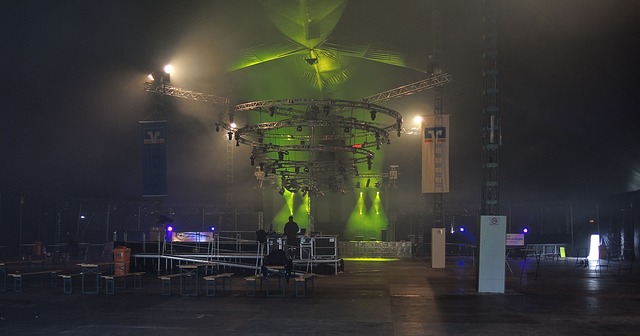Successful event planning for local businesses requires understanding their unique needs, from customer attraction to networking. By identifying resonant themes, leveraging local resources, and creating inclusive events, planners can stimulate economic growth and strengthen community spirit. A detailed checklist ensures every aspect is managed, while strategic partnerships with vendors enhance event quality and foster a sense of belonging. Effective marketing using social media, email, traditional ads, and word-of-mouth encourages business participation. Measuring success through clear metrics and feedback surveys provides valuable insights for refining future events.
Community events are a powerful tool for local businesses to connect, engage, and thrive. This article provides an all-encompassing guide on event planning for local businesses, focusing on strategies to organize successful community gatherings. From understanding your target audience to marketing effectively, we cover essential steps like identifying suitable event types, creating checklists, building partnerships with local vendors, and measuring success through feedback. By following these insights, businesses can foster stronger community ties and drive growth.
- Understanding Your Local Business Community's Needs
- Identifying Suitable Event Types and Themes
- Creating a Comprehensive Event Planning Checklist
- Building Partnerships with Local Vendors and Suppliers
- Marketing Your Events Effectively to Engage the Community
- Measuring Success and Gathering Feedback Post-Event
Understanding Your Local Business Community's Needs

Understanding your local business community’s needs is a critical step in successful event planning for local businesses. By engaging with local companies, organizers can gain valuable insights into their specific requirements and goals. This may include attracting new customers, networking opportunities, promoting products or services, or enhancing brand visibility. Each business has unique aspirations, so tailoring events to meet these diverse needs is essential.
Event planners should aim to create inclusive spaces where businesses can connect, collaborate, and foster partnerships. This involves considering the target audience, their interests, and how the event can offer tangible benefits. Well-organized gatherings can be a game-changer for local economies by encouraging business growth, fostering community spirit, and providing a platform for exchange and innovation within the entrepreneurial ecosystem.
Identifying Suitable Event Types and Themes

When it comes to community events organized with ease, the first step is to identify suitable event types and themes that resonate with your local audience. For event planning for local businesses, consider what will appeal to both residents and visitors alike. Whether it’s a cultural festival celebrating the diverse heritage of your area, a wellness workshop promoting healthy living, or a business-focused networking event, choosing a theme that aligns with community interests is key.
Local businesses can play a pivotal role in this process by assessing their resources and expertise. For instance, a local café might host a book club, while a fitness studio could organize a charity run. By selecting events that leverage the strengths of local businesses, you create engaging opportunities that foster community spirit and strengthen business connections within the neighborhood.
Creating a Comprehensive Event Planning Checklist

When planning community events for local businesses, creating a comprehensive event planning checklist is paramount to ensuring success. This checklist should encompass every critical aspect, from defining the event’s purpose and setting clear objectives to selecting an appropriate venue that aligns with your expected turnout. It’s essential to consider logistics like parking availability, accessibility, and any necessary permits or licenses.
Moreover, the checklist must include task management for promotional activities, such as designing eye-catching flyers, crafting engaging social media posts, and reaching out to local media outlets. Keep track of vendor partnerships, including catering, entertainment, and sponsorship arrangements. Don’t forget to allocate time for budgeting, financial tracking, and evaluating post-event feedback to inform future planning efforts for event planning for local businesses.
Building Partnerships with Local Vendors and Suppliers

Community events are a powerful way to bring people together and foster a sense of belonging. One key aspect of successful event planning is building strong partnerships with local vendors and suppliers. These relationships can significantly enhance the overall experience for both organizers and attendees. By engaging with local businesses, event planners gain access to unique resources, such as fresh produce, artisanal goods, and specialized services tailored to the community’s needs. This collaboration not only supports local economy but also adds authenticity and diversity to the event.
For event planning professionals, reaching out to local vendors early in the process is essential. Open lines of communication allow for better understanding of each other’s capabilities and expectations. Vendors can offer valuable insights into community preferences and trends, enabling organizers to create events that resonate deeply with attendees. Moreover, partnering with local suppliers streamlines logistics, making event coordination more efficient and cost-effective. This mutual support network contributes to the success and sustainability of both businesses and community events.
Marketing Your Events Effectively to Engage the Community

Effective marketing is key to making your community events a success and fostering engagement among local businesses. In today’s digital age, leveraging online platforms is essential. Create dedicated event pages on social media sites, utilizing hashtags related to event planning for local businesses and the specific occasion. Share regular updates, behind-the-scenes content, and early bird registration reminders to build anticipation. Email marketing campaigns can also be powerful tools; send personalized invites to nearby companies, highlighting the benefits of attending, such as networking opportunities or exclusive offers.
Additionally, consider traditional methods like local newspaper advertisements, community bulletin boards, and partnerships with neighborhood influencers or bloggers. Word-of-mouth is a game-changer; encourage satisfied attendees to spread the news by offering incentives for successful referrals. Effective marketing ensures your events reach the right audience, fostering a vibrant and engaged community spirit.
Measuring Success and Gathering Feedback Post-Event

Measuring success and gathering feedback post-event are crucial aspects of event planning, particularly for local businesses looking to enhance their community engagement. By collecting quantitative and qualitative data, organizers can gain valuable insights into what worked well and what could be improved for future events. This process involves setting clear metrics beforehand, such as attendance numbers, vendor satisfaction, and participant feedback scores.
Post-event surveys, polls, or focus groups are effective tools to engage participants and gather their opinions. This feedback should be carefully analyzed to identify trends, common themes, and areas of interest. Event planners can then use these insights to refine their strategies, ensure a better attendee experience, and foster stronger connections within the local business community.
Organizing community events that align with local business needs is a powerful strategy for fostering engagement, collaboration, and growth. By understanding your audience, selecting relevant themes, and leveraging partnerships, you can create memorable experiences that resonate with attendees. A well-planned event, executed with effective marketing and measured outcomes, becomes a cornerstone of successful event planning for local businesses, encouraging continued community involvement and mutual support.



